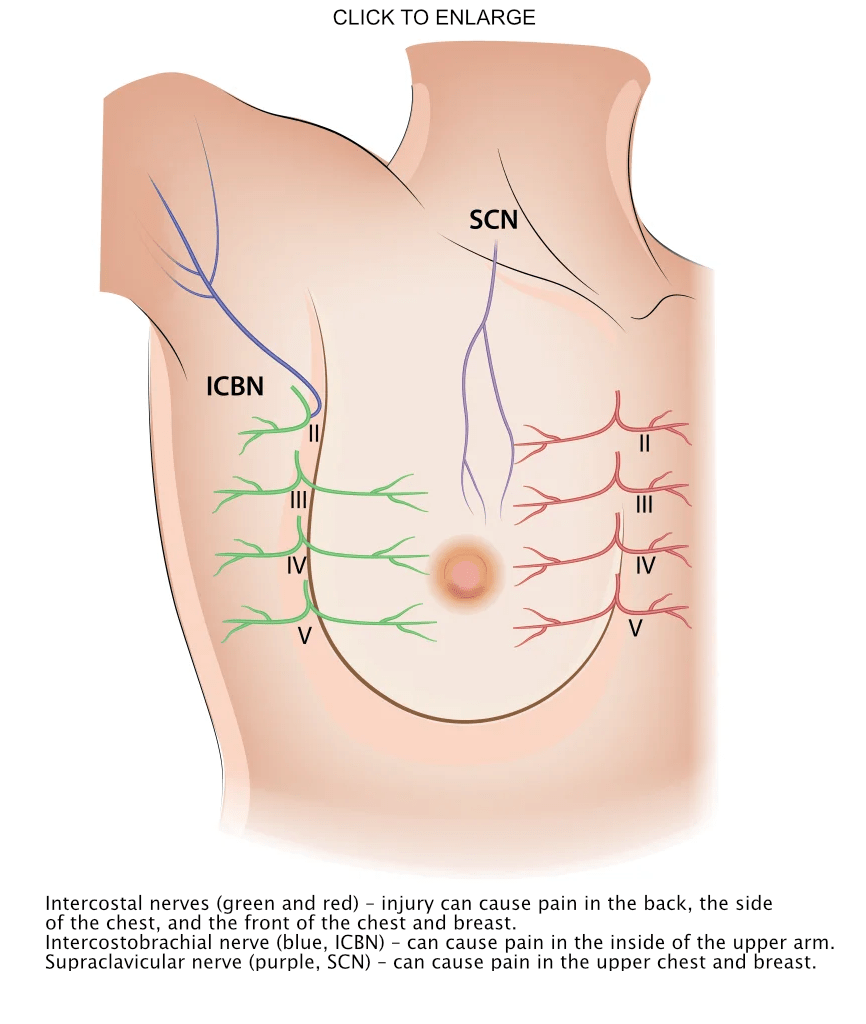Post Mastectomy and Chest Surgery Pain
Reports indicate that 40-60% of patients who undergo mastectomy suffer from chronic pain.
Peripheral nerve surgery may be an option for eliminating chronic pain after mastectomy as well as any breast or chest surgery.
Studies have demonstrated that patients with post- operative chest or breast pain experience significantly worse quality of life including physical, autonomy, and psychological well-being. Long-term pain leads to decreased work function, increased healthcare utilization, and increased depression risk.
Even breast augmentation, biopsy, or reconstruction can result in chronic pain. Other operations including heart or lung surgery or truama such as a broken rib or collar bone can cause chronic nerve pain which can be treated!
Our experience shows that post-mastectomy pain can be similar to the pain experienced by limb amputation patients, with average pain scores of 8 out of 10! Therefore, post-mastectomy pain has far-reaching physical and psychological consequences.
Patients with chronic post-mastectomy pain can also experience significant discomfort from even minor irritations like the touch of bedsheets or clothing, seat belts, coughing, or even giving a hug.

The first step to solving pain after mastectomy or other chest surgery is understanding that sensory nerve injury is a major cause! This is not surprising, since multiple small nerves are injured during surgery, including the intercostal sensory nerves, the intercostobrachial nerve, and the supraclavicular nerve.
When breast tissue is surgically removed from the chest, sensory nerves traveling through these tissues are cut, stretched, or caught up in scar. These injuries can lead to chronic pain due to development of end neuromas, neuromas-in-continuity, and scar tethering or compression. We have proven that chronic pain comes from these injured nerves, and that that we can find them and disconnect the pain!
Opioids, NSAIDs such as ibuprofen, and neuropathic drugs including gabapentin, pregabalin and amitriptyline are sometimes helpful in reducing the pain down to acceptable levels. However, these treatments are often insufficient due to incomplete pain relief, inconsistent administration, and adverse effects including chronic dependence, gastrointestinal distress, and dizziness and fatigue.
In a large study, over 10% of patients who had not previously taken narcotic pain medications continued to use them for more than 3 months after breast surgery. These patients often require opioid doses similar to those taken by chronic opioid users. These are concerning statistics which highlight a significant problem.
Our experience shows that injured nerves can be readily identified as the source of pain. During your visit, the surgeon will listen to your description of your pain, and perform an examination designed to pinpoint the location of the injured nerves. You may be offered the opportunity to have a small injection of local anesthetic that can relieve the pain for a few hours. If the diagnostic block is successful, then you will finally have a diagnosis for the problem! We can then discuss outpatient operations that can make the pain relief permanen.
Once nerve injury is identified as the source for the pain, surgical removal of the small, offending nerves can be performed in a straightforward outpatient operation. Incisions on the side or front of the chest provide access to small nerves that come out to the skin from under the ribs. These damaged nerves are excised, with the anticipation of permanent resolution of the pain. The side effect is numbness in the area – most patients accept this numbness as a welcome trade-off.
- Acute exertional compartment syndrome of the forearm. Dhawan V, Borschel GH, Brown DL: J Trauma 64(6): 1635-1637, 2008.
- Effective Treatment of Chronic Mastectomy Pain with Intercostal Sensory Neurectomy. Hart S, Agarwal S, Hamill JB, Brown DL: Plastic and Reconstructive Surgery 14:5: 876-80, 2022. PMPS
Nerve Surgery Helps Relieve Chronic Pain Following Breast Surgery
The majority of patients with chronic pain report significant decreases or complete resolution of their pain. Most patients describe that the ‘nerve pain feelings’ are improved as soon as the following day. Discomfort from the operation is frequently described as a completely different sensation, which subsides in the next few weeks.